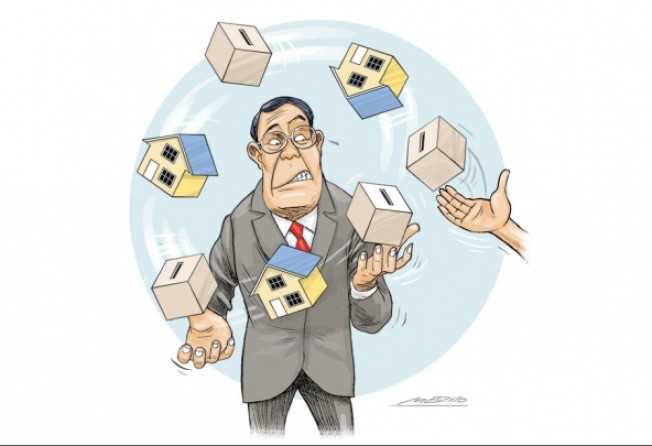Housing market crash would only add fuel to Occupy Central campaign
Grant Chum says with a conflagration over political reform threatening to erupt, officials now have less room to move on the housing front, and the status quo may be the best hope

A year ago, I suggested in these columns that Leung Chun-ying's term as chief executive will be judged primarily on how he tackles the twin issues of housing and political reform, and that a stronger advocacy of a coherent ideology on both those issues would be critical to his success.
Since then, these two ostensibly distinct issues have become more interwoven. House prices have soared by another 18 per cent, while the birth of the Occupy Central movement for universal suffrage has aroused serious concern in Beijing and the pro-establishment camp in Hong Kong. In Leung's inaugural policy address in January, constitutional development received only the most perfunctory of mentions - just two paragraphs out of a total of 200.
The danger of not containing the controversy over Occupy Central is patently evident. Yet the key to such containment lies not simply in providing more forceful political leadership on the universal suffrage debate. Ensuring that Hong Kong people are more satisfied over livelihood issues (housing being the overarching one) will also be vital in limiting mass protest over purely political issues such as electoral reform.
On housing policy, after successive tightening measures, the relentless ascent of house prices since 2009 has finally begun to reverse. Does this represent political success? In the short term, yes: a further significant rise in home prices is undesirable as it increases the potential of an asset bubble, further widens the wealth gap and gives the sense that the government is losing control.
Yet very little in terms of a real long-term policy objective is achieved in the event of a house price correction. Even a 25 per cent decline in prices would only take us back to levels that prevailed at the end of 2010 - a time when Hong Kong households were hardly celebrating the easy affordability of housing, and which coincided with the introduction of the special stamp duty measures.
In fact, assuming interest rates normalise over the next several years, nearly 80 per cent of households (the proportion that earn less than HK$40,000 per month) would still find ownership of private housing either unaffordable or relatively expensive (at least those without the aid of inter-generational wealth transfers).
At the same time, such a price decline would have a significant impact on existing homeowners, particularly those who bought homes in the past two years. It also has the potential to drain the current administration of political capital, and so pave the way for a surge in political discontent. The universal suffrage issue and Occupy Central would merely act as convenient venting channels. Thus, in the short term, the best, and in fact only, outcome the government can aim for is for house prices to be broadly unchanged.
But what of the real long-term policy objectives in housing? Leung states in his policy address that he believes it is insufficient to provide government rental accommodation but it is necessary to support home ownership by the middle class as this is "crucial to social stability". This is fine, provided that a chief executive who espouses such a philosophy realises he must then implicitly support a macro and policy context that allows house prices to rise at least in line with inflation in the long term. A macro context where home prices decline in real terms on a prolonged basis is unlikely to create much social stability even as home ownership increases.
There are three prospective paths to increasing home ownership among middle-income households: first, bring about a major price correction; second, have the government subsidise the purchase of private housing at current "peak" prices via equity loans and interest subsidies; and third, massively expand the supply of subsidised housing or hybrid forms of private housing that are restricted in their sale and transfer to first-time Hong Kong buyers, potentially at the expense of traditional private housing supply and government fiscal income from land sales. The first two options are non-starters while the third requires a more radical policy agenda than the current administration is likely to risk.
Unfortunately, with the constitutional reform issue already "detonating" so early in his tenure, Leung may have limited time to chart a more radical course for housing policy. Between now and when the threat of Occupy Central is eventually defused, he needs to minimise the risk of it becoming an umbrella protest movement against the government.
The ultimate irony is that having expended so much political energy in cooling house prices in its first year in office, the administration may have to spend its second year surreptitiously ensuring that there is no disorderly housing crash. Such a crash, with its concomitant economic fallout, could prove incendiary to the political protest of Occupy Central. The strong inverse correlation between economic prosperity and political protest was vividly played out in the early 2000s.
Typically, it takes a livelihood issue to bring out the fabled silent majority for what would otherwise be a purely political cause. Remember July 2003?
Grant Chum is head of Hong Kong equity research at UBS